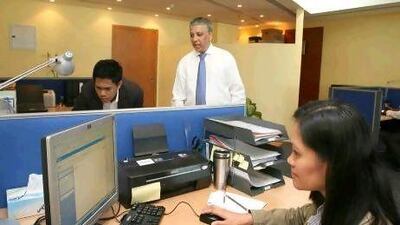As one year ends, and a new one is set to begin, many small business owners are finding themselves in the midst of major transitions.
Are you the strongest link?
Business Quiz 2011 Do you have your finger on the pulse of business? Take our online contest for your chance to win brunch for two. Take the quiz
For Thomas Chacko, next year will be about finding a buyer for his business, TC Consultancy Group, and downsizing his ownership holding from 100 per cent to zero.
Mr Chacko, who heads a project management consultancy that focuses on building design and construction, has opened a handful of branches in Sharjah, Abu Dhabi, Qatar and India, among others.
But while it was his passion to set up the venture, he now feels that his "age factor" at 60 puts him at somewhat of a risk in running the company for too much longer. "I need to pass this on to somebody else," Mr Chacko says.
"I have approached [a] few people in the local market as well as international companies who want their presence in the Middle East," he adds. "Their responses are awaited."
Yet securing outside funding - whether from a local investor, international company or bank for that matter - is expected to become more challenging next year, experts warn.
Part of the problem is that many small businesses in the Emirates still fail to outline proper payment terms and thereby delay revenue due from clients, which then makes a venture less enticing to outside parties who can provide funds for buyouts or expansions.
"If you're running a small or medium enterprise (SME), and you don't have proper payment terms, it stretches from between 60 and 90 days up to 180 and 240 days, which is difficult for an SME to take," says Ron Ribeiro, the chief executive of Aryan Business Consulting, an advisory based in Dubai.
Those looking at a selling a local business are advised to create strict payment terms and perhaps follow Mr Chacko's lead by reaching out to international companies situated in areas such as Europe.
"A large per cent of SMEs in Europe are finding their markets are drying up there," says Mr Ribeiro.
"They're looking at the Bric countries (Brazil, Russia, India, China). The UAE and Gulf is also very attractive."
SMEs with fewer than 250 employees and an annual turnover of less than Dh250 million (US$68m), and who are looking to banks for loans to fuel expansion plans or get through tough times, are expected to receive better guidelines next year on how to obtain a slice of money.
In recent months, the Dubai Chamber of Commerce has held meetings with a taskforce made up of SME owners, as well as representatives from Mashreq, HSBC and other banks, to develop better ways to access finance - and at lower rates.
Next year, this task force is expected to share guidelines about how SMEs "should set themselves up to qualify for bank loans", says Hameed Noor Mohamed, the head of SME banking at Mashreq.
"SMEs are getting the loans but probably not at the required level, which is primarily due to the SMEs themselves," Mr Mohamed says.
Currently, Mashreq relies on a so-called relationship manager who oversees each SME account holder that has taken out a loan and watches their business cycle "very closely" he says.
If financial troubles start to arise, it is hoped that the relationship manager will quickly spot them and be able to help navigate an SME owner through turbulence.
Yet the taskforce is aiming to provide more owners with guidance at the launching phase of a business, in order to prevent many entrepreneurs from struggling to repay loans later.
"It's a work in progress and a similar process is being done by the Khalifa Fund [for Enterprise Development among Emirati entrepreneurs] in Abu Dhabi, where they want to put together guidance on how SMEs should run their business and what kind of documentation they need to qualify for a bank loan," says Mr Mohamed.
twitter: Follow our breaking business news and retweet to your followers. Follow us

